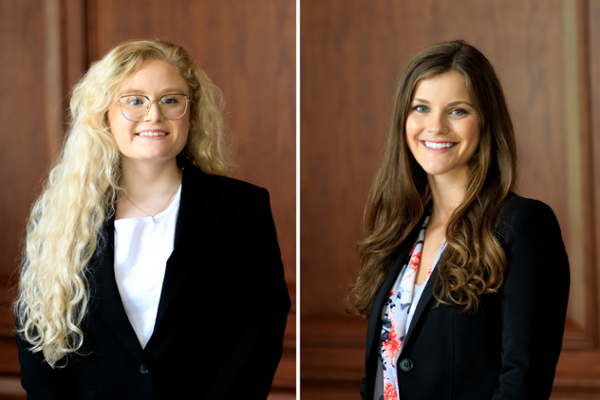Published on May 22, 2023 by Morgan Black

Abigail White, Haleigh Chambliss
Two members of Cumberland School of Law’s class of 2023 have secured judicial clerkships for the year after graduation. Haleigh Chambliss and Abigail White will work for Associate Justice Greg Cook of the Supreme Court of Alabama during the 2023-24 term.
At Cumberland School of Law, Chambliss, of Halls, Tennessee, served as editor-in-chief of the Cumberland Law Review and was a Caruthers Fellow, supporting the Lawyering and Legal Reasoning program. White, of Adger, Alabama, served as managing editor of the Cumberland Law Review and was director of mediation for the trial advocacy board.
In recent years, Cumberland graduates have served as law clerks for judges on the United States Court of Appeals for the Eleventh Circuit and the United States District Courts for the Middle, Northern and Southern Districts of Alabama. Others have worked for judges on the Supreme Court of Alabama and the Court of Civil Appeals, as well as state trial courts in Birmingham, Huntsville, Mobile and Tuscaloosa.
Chambliss and White follow Daniel Moss, J.D. ’20, who served as a law clerk for Associate Justice Jay Mitchell at the Supreme Court of Alabama. They are both grateful for their experiences at Cumberland School of Law that prepared them for this opportunity and are looking forward to beginning their law careers in this realm.
Chambliss said, “I am grateful for the opportunity to clerk for the Supreme Court of Alabama and eager to begin learning from Justice Cook and his team. The ability to work in Justice Cook’s chambers will be invaluable, and I am confident that I will profit greatly from his knowledge, experience and mentorship. I am also grateful to the Cumberland faculty for their guidance and encouragement through the application process. Without their support, this distinguished opportunity would not have been possible.”
White said, “Before attending law school, I was unaware that post-graduate judicial clerkship opportunities existed. However, thanks to my incredible professors and the Career Development Office, I was quickly placed on the path to pursue a judicial clerkship by spring of my 1L year. Without the continued support and guidance of Rachel Martin in the Career Development Office, Professor Taaffe, Professor Anderson and Professor Dike-Minor, I do not think I would have received the invaluable opportunity to clerk for Justice Cook. It is an honor to begin my legal career with Justice Cook, and I look forward to all the unique insight, practical experience, and incomparable mentorship that I will receive from Justice Cook and his staff.”
Judicial clerkships, which are awarded through a highly competitive application process, provide unique opportunities for new lawyers to see litigation from the judges’ side of the bench. Law clerks work closely with their judges and co-clerks, reviewing written briefs, conducting legal research and assisting their judges in preparing for oral arguments and writing opinions. They gain valuable experience participating in the day-to-day work of their judges’ courts and learning how judges make decisions on a wide variety of legal issues. At the same time, they sharpen their legal research, analysis and writing skills in preparation for law practice.
For more information about opportunities for judicial clerkships, contact Cumberland School of Law’s Career Development Office or Associate Professor Jeff Anderson, the law school’s judicial clerkship coordinator.
Located in the Homewood suburb of Birmingham, Alabama, Samford is a leading Christian university offering undergraduate programs grounded in the liberal arts with an array of nationally recognized graduate and professional schools. Founded in 1841, Samford enrolls 6,324 students from 44 states, Puerto Rico and 16 countries in its 10 academic schools: arts, arts and sciences, business, divinity, education, health professions, law, nursing, pharmacy and public health. Samford is widely recognized as having one of the most beautiful campuses in America, featuring rolling hills, meticulously maintained grounds and Georgian-Colonial architecture. Samford fields 17 athletic teams that compete in the tradition-rich Southern Conference and boasts one of the highest scores in the nation for its 97% Graduation Success Rate among all NCAA Division I schools.
